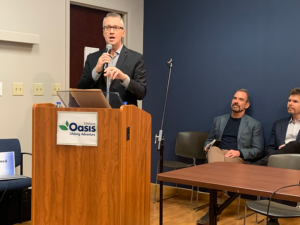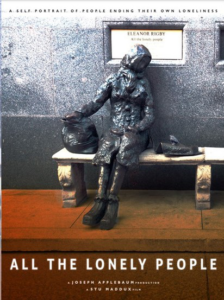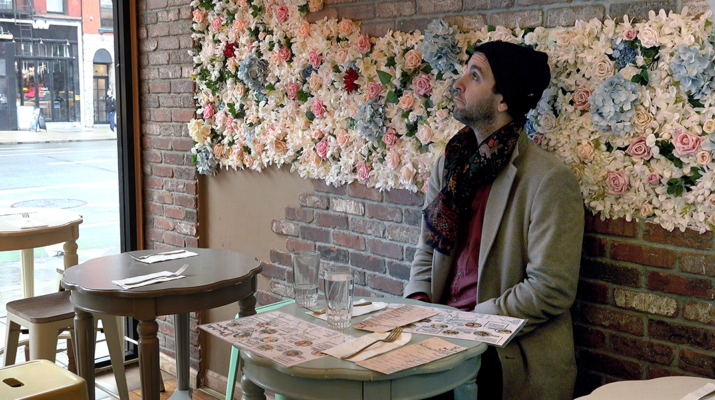By David Figura
Or as a famous newscaster in Syracuse says: ‘Loneliness sucks’
“Loneliness sucks. And at times, it sucks so bad it really hurts.”
Michael Benny, a CNY Central TV news anchor, made that comment at a recent screening of the documentary, “All The Lonely People,” at the Upstate Oasis building in East Syracuse.

The film, which featured a panel question and answer discussion afterward, was attended by representatives of local public and private organizations that deal with the issue.
Benny, who moderated the event, said the nearly 60-minute film really resonated with him. He noted after his grandfather died it was extremely painful to watch how his grandmother was negatively affected both mentally and physically by the loss of her husband —and how things worsened with the rapid loss afterward of close friends and other family members.
The film was produced, written and directed by Joseph Applebaum, 58, and Stu Maddux, 57, of the Clowder Group, a San Francisco-based film production company that focuses on social issues. The film’s title comes from The Beatles’ song, “Eleanor Rigby.”
“We wanted to draw attention to this important issue and leave people with a sense that there are solutions,” Applebaum said. “And maybe it will make people pause to think how isolation and loneliness is affecting their own lives or the people around them that they may have not considered.”
The documentary features the stories of three men and four women, ages 17-89, from locations including Alaska, San Francisco, New York City and the United Kingdom. It traces the circumstances that caused their loneliness and the actions they took to change their lives for the better.
Between Oct. 3 and Nov. 4, the New York State Office for the Aging sponsored 20 free screenings of the film at different locations across the state, hoping to spark reaction and action among government officials, health care agencies and others.
In 2017, the U.S. Surgeon General declared social isolation a global pandemic — one that only worsened during the COVID-19 pandemic.
According to the AARP Public Policy Institute, social isolation and its effects has resulted in $6.7 billion annually in associated Medicare spending.
Loneliness can be as lethal as smoking 15 cigarettes a day, according to Julianne Holt-Lundstad, professor of psychology and neuroscience at Brigham Young University, one of the researchers cited by the film. It affects more than one third of American adults, impacting one’s mental health by worsening depression, anxiety, mood disorders and cognitive decline. Also, it can worsen one’s physical health, leading to higher rates of cardiovascular impairment, chronic pain and fatigue.
Loneliness is a normal emotion anyone can experience. It’s not indicative of a personal failing. There are different experiences and reasons that contribute to it.
Causes, as the film points out, include the loss of a loved one; chronic or catastrophic illnesses; being estranged from one’s family; frequent moves or a move to locations where one has no social connections; feeling “othered” (living where you don’t feel welcomed); poverty and financial insecurity; lack of transportation — and heavy reliance on social media for all one’s social connections or as a sole sounding board of how one is managing one’s life.
“Loneliness often comes from a lack of meaningful social connections,” Applebaum said.

Research has shown that everyone should have at least three reliable people (family or friends) who they can share their problems with, and can call for help in the event of an emergency, he noted.
Certain age groups, notably adolescents, young adults and older adults, seem to be particularly at risk with growing incidences of depression, substance abuse and suicide, according to the film.
Solutions include: making efforts to connect with others, catching up with old friends and investing time in maintaining current friendships, seeing what programs are available in your community that facilitate meeting and interacting with others, joining local groups or classes based on your interests, stepping outside your comfort zone to try something new and volunteering.
Other individual actions include reaching out and telling others you are feeling lonely today; motivating yourself to move — to change situations that keep you isolated; caring for an animal (pet); expressing gratitude; getting outdoors and connecting with nature; performing random acts of kindness and focusing on the good things in your life.
Ironically, as the film points out, one can be surrounded by people and still feel the sting of loneliness. Or, be physically isolated and still not feel lonely.
Ari Rossen, a 41-year-old entertainer in Manhattan, laments in the film how he lives in a high-rise apartment building with 600 people and he only knows a few by name.
And then there is Carol Hill, a woman in San Francisco in her late 70s who lives in an apartment in Section 8 housing. Due to physical ailments, she hasn’t left her bed in six years. But thanks to her vibrant personality and reaching out to others, she’s often visited or called by family and friends.
“She told me once she has so many people coming over that she wishes she had more time alone,” Applebaum said. “She’s isolated, but certainly not lonely. Isolation is a physical issue and loneliness something beside that.”
The film points out the United Kingdom is a step ahead of America in dealing with the issue, having created a Ministry of Loneliness. The country has taken such steps as placing “Chat Benches” in urban areas where lonely individuals can sit and chat with caring passersby; and has set up “Man Sheds” where lonely men can stop in any time and engage in woodworking or other activities/hobbies.
Upstate Oasis in East Syracuse is part of a national nonprofit educational organization designed to enhance the quality of life for adults age 50 and older by helping individuals make new friends and explore new activities. Activities include exercise programs along with educational and volunteer opportunities. See https://upstate.oasisnet.org/
For more on “All the Lonely People” and solutions to loneliness and social isolation, see www.allthelonelypeoplefilm.com

